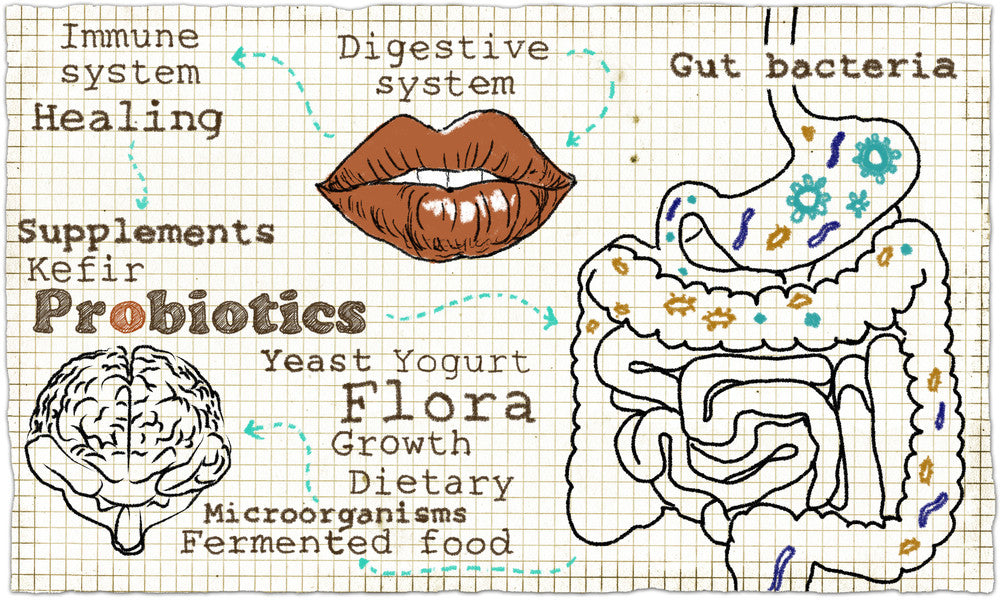Whilst many people have heard the word ‘probiotic’ there’s an element of confusion around it!
Essentially, probiotics are really helpful friendly bacteria that naturally live in our digestive systems. When present in adequate amounts, they provide some amazing health benefits.
Clinical Nutritionist, Suzie Sawyer, shares some wonderful reasons to include them in the daily diet.
Probiotics beat the bloat!
It seems to be the curse of modern times! Daily bloating, flatulence and sluggish digestion. However, whilst there can be a number of reasons for these symptoms, if you’ve not got enough of the friendly bacteria in your digestive system, you can frequently stop these problems in their tracks!
Food such as natural, live yoghurt provides some of the best sources, so try to include live yoghurt, especially ‘probiotic yoghurt’ in your daily diet. Alternatively taking a probiotic supplement, particularly containing the most prevalent strains in your gut, Lactobacillus and Bifidobacterium, is going to be most effective.
They boost immunity!
Strange as it may seem, much of our immune system that protects us from all kinds of unwanted invaders is actually regulated from the digestive tract. Indeed this is where many immune markers reside. It makes logical sense, therefore, that a healthy gut makes for tip-top immunity. This is where probiotic or the friendly bacteria play a key role.
Friendly flora = equal healthy children!
A study published in Pediatrics, suggests that a daily probiotic supplement could help to reduce cold and flu-like symptoms by 50% or more (1). The study reviewed children between ages three and five, who were given a combined probiotic containing Lactobacillus acidophilus and Bifidobacterium. The results showed an impressive 73% reduction in runny noses and coughing plus reduced duration of symptoms, further proving their effectiveness in boosting immunity.
They’ll keep weight in check!
Whilst eating too much sugar and refined foods will encourage weight gain, it will also deplete the natural friendly flora. This, in turn will mean that more calories are extracted from the foods we eat but it also upsets the balance of the hunger hormone, ghrelin, thereby encouraging us to eat more.
Additionally, prebiotics which naturally feed the good bacteria, found in bananas, asparagus, green tea, Jerusalem artichokes, garlic, pak choi, leeks and onions, help to manage weight appropriately. Plus, they’ll also help to keep that friendly flora in fine form too!
Probiotics make vitamins!
Strange as it may seem, probiotics actually produce vitamin K, which is great for a healthy heart and bones, and some of the B vitamins. More specifically, they help to produce vitamin B12 which is needed for energy production and a number of other essential body functions.
As B vitamins are water-soluble, they are also quickly excreted from the body. Therefore, a ready-made supply from the gut is going to be super-handy!
Probiotics are stress-busters!
Friendly flora are responsible for producing most of our serotonin (our ‘happy’ hormone). Indeed, a study published in The British Journal of Nutrition (2) found that a probiotic containing a combination of Lactobacilli and Bifidobacteria had a beneficial effect on stress-related symptoms.
The results showed that symptoms of psychological distress, depression, anger, and problem-solving were significantly improved when taking the probiotic combination as opposed to a placebo.
They make beautiful skin from within!
All the creams, lotions and potions are not going to give you radiant skin if your gut flora is out of balance. The exact mechanism of the signalling going from gut to skin is still being researched. However, what we do know is that probiotics have been extensively shown to be very beneficial in cases of eczema and dermatitis, which includes cases in children.
And because your skin has its own eco-system of billions of bacteria, creams are currently being developed that contain probiotics to topically treat various skin conditions.
They’re great after antibiotics!
Antibiotics are readily administered for a wide variety of bacterial infections. Whilst they kill the infection, they also destroy much of the friendly flora. If you’ve ever noticed more stomach problems such as wind and bloating after taking a course of antibiotics, this is the reason why.
Therefore, as soon as you start taking antibiotics, you should begin a course of probiotic supplements that contain a range of Lactobacilli and Bifidobacterium strains to help replenish your natural friendly flora. You’d be well advised to continue taking these for at least a month after finishing the antibiotic course to ensure you’re not depleted.
They’re in fermented foods!
As well as being found in ‘live’ yoghurts, probiotics are also prevalent in fermented food which are eaten in abundance in eastern cultures. Food such as sauerkraut, natto, miso, soy sauce, tempeh and kefir, a fermented milk drink, deliver amazing health benefits to the digestive tract. These foods have been around for hundreds of years and are now becoming more readily available in western cultures.
They are very available in supermarkets and can all be incorporated into everyday cooking: soups, stews, raw food diets, smoothies …… the list is endless.

Detox and clean-up!
We love the word ‘detoxification’ because we know it promotes good health and feeling energised. Obviously there are many kinds of detoxification programmes. However, don’t forget the body, and particularly the liver, is detoxifying every minute of every day as part of its natural processes.
Sometimes, though, the liver needs a little help, bearing in mind it’s the most overworked organ in the body (for obvious reasons!) Probiotics naturally aid its detoxification processes but also help to rid the body of unwanted toxins. More specifically, probiotics help to process old hormones, therefore helping any kind of hormone imbalance.
Everyone, both adults and children alike, can benefit from increasing their intake of probiotic and prebiotic foods, but also from taking a supplement, particularly where there are specific health issues, or after antibiotics.
(1) Leyer GJ et al. Probiotic Effects on Cold and Influenza-Like Symptom Incidence and Duration in Children. Pediatrics 2009. 124.pp172-179
(2) Messaoudi M et al. Assessment of psychotropic-like properties of a probiotic formulation in human subjects. British Journal of Nutrition 2010.

